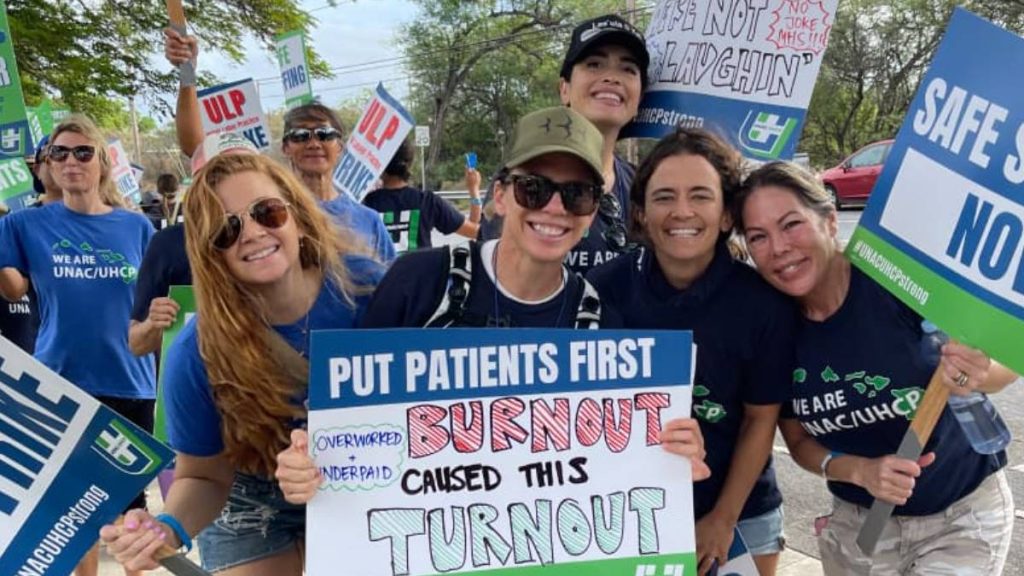More Kaiser Permanente union workers in Hawaiʻi authorize strike, making walkout possible
More than 2,000 Kaiser Permanente employees in Hawai‘i have authorized their union to strike, uniting with thousands of healthcare workers across the United States who are gearing up for potential walkouts as union contracts approach their expiration dates.
Members of UNITE HERE Local 5, representing more than 1,900 Kaiser employees — including hospital aides, pharmacy technicians, housekeeping and dietary workers — voted 97% in favor of granting strike authorization, according to the union.
The Hawaii Nurses and Healthcare Professionals union reported that 89% of its represents 1,200 members —nurses, nurse practitioners, respiratory therapists and lab professionals — also approved strike authorization.
“The results of our strike authorization vote make it clear, we’re ready to do whatever it takes to settle a new contract that puts our patients first and addresses our staffing and workload concerns,” said Cade Watanabe, financial secretary-treasurer of the Local 5 union, in a news release.

The vote gives union leaders the authority to call a strike if negotiations with Kaiser Permanente do not result in agreements before the contracts expire on Sept. 30.
Should walkouts take place, they would constitute one of the most significant healthcare labor actions in recent U.S. history.
Kaiser Permanente did not immediately respond to a request for comment.
Last Thursday, more than 1,900 Kaiser Permanente hospital workers in Hawai‘i began casting ballots in a strike authorization vote this week, while tensions rose over ongoing contract negotiations.
Terilyn Carvalho Luke, president of the Hawaii Nurses and Healthcare Professionals said their “members believe in treating patients like family and have continued to do this despite the continued challenges post Covid, where they gave 200% of themselves to be there for Kaiser.”
She adds that her team is “burnt out with the continued staffing challenges and experienced staff leaving the bedside, thus causing a staffing mix that is less than desirable and taxing to all caretakers.”
According to union officials, some Hawai‘i employees earn up to 30% less than colleagues in comparable positions on the mainland, and their benefits packages fall short of what other Kaiser workers receive.
Union representatives say their top concerns include safer staffing levels to protect both workers and patients, as well as fair pay increases.
Y.David Schoen, Registered Nurse in the Neonatal Intensive Care Unit, said in the news release, “We provide the best service and quality of care and advocate for our patients every day.”
“We are their voices and our members need a voice at the table to ensure that we can continue to provide the high-quality service and care every patient deserves.”
Talks in the state of Hawai‘i began locally in April, followed by national bargaining in May with Kaiser Permanents, the country’s largest nonprofit healthcare system.
The dispute in Hawai‘i reflects a larger labor standoff nationwide.

In total, contracts covering 52,000 Kaiser employees in multiple states are set to expire at the end of September and early October.
About 30,000 registered nurses, pharmacists, therapists and other frontline professionals at Kaiser Permanente in Hawaiʻi and California authorized a strike on Friday over safe staffing and fair wages, according to a news release from the United Nurses Associations of California/Union of Health Care Professionals.
So far, unions representing roughly 46,000 workers in California, Oregon, Washington, Maryland, Virginia, and Washington, D.C., have also authorized strikes.
Two years ago, mental health clinicians represented by the National Union of Healthcare Workers reached a tentative agreement with Kaiser Permanente on a three-year contract, after nearly a six-month strike.
The strike, which lasted 172 days, was the longest work stoppage by mental healthcare workers in U.S. history.



